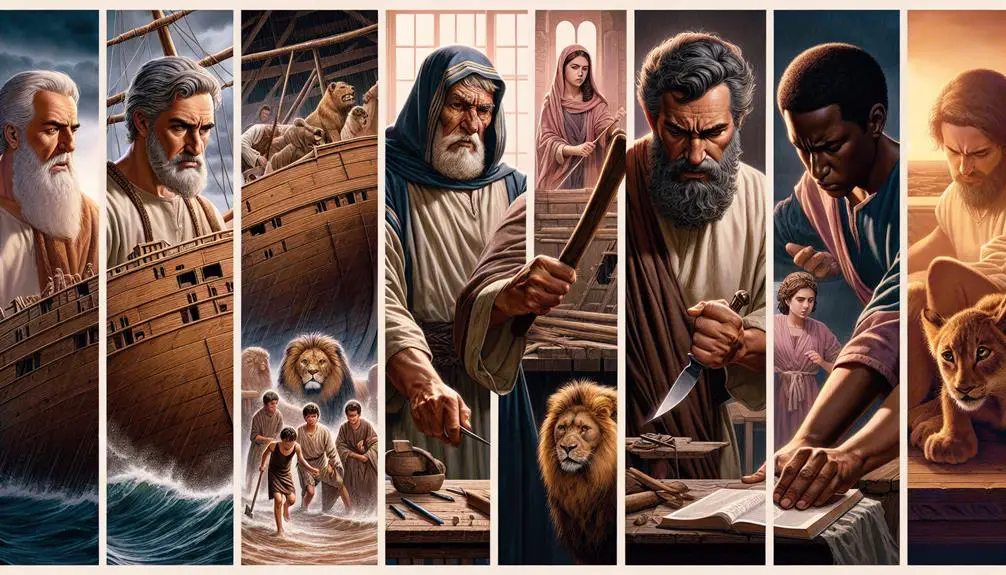Journey through biblical tales of unwavering faith and devotion, and uncover lessons in commitment that transcend time.

Examples of Commitment in the Bible
Just as a seed must commit to the soil to blossom, the Bible presents myriad examples of steadfast commitment that you might find both enlightening and inspiring.
From Noah's unwavering faith amidst a deluge to Ruth's devotion in the face of uncertainty, these stories aren't just ancient history; they're lessons in perseverance, loyalty, and the power of belief.
As you explore these narratives, consider how they resonate with challenges you face today. By the end, you might just discover a new perspective on commitment that's as relevant now as it was thousands of years ago.
Key Takeaways
- Biblical figures like Noah and Abraham demonstrate the power of unwavering faith and obedience to God's commands.
- Ruth and Esther's stories highlight the importance of courage and commitment to one's beliefs, even in the face of adversity.
- Daniel's life exemplifies steadfast faith and the impact of maintaining spiritual discipline under challenging circumstances.
- The widow's offering and Paul's conversion teach the significance of selfless giving and the transformative potential of true faith.
Noah's Ark: A Test of Faith

In the narrative of Noah's Ark, the unwavering commitment of Noah to God's command exemplifies a profound test of faith, setting a precedent for obedience and trust in divine will. This story, more than a mere recount of survival, delves into the realms of animal welfare and construction challenges, presenting Noah's dedication not only as a spiritual endeavor but also as an early testament to responsible stewardship and innovative problem-solving.
Noah's adherence to divine instructions underscores a meticulous concern for animal welfare, long before the concept became a societal imperative. You're invited to consider the enormity of gathering pairs of every living creature, ensuring their survival over an extended period. This act of preservation signifies a dual commitment: to God's command and to the ethical treatment of animals, highlighting a reverence for life that transcends human-centric concerns.
Furthermore, the construction of the Ark itself presents a narrative rich with challenges and lessons in faith-driven perseverance. Noah's task, building an immense vessel capable of withstanding the deluge, epitomizes the physical manifestation of faith. Despite the absence of modern engineering knowledge and facing what must have seemed insurmountable odds, Noah's commitment didn't waver. This part of the story encourages you to reflect on the significance of faith in overcoming obstacles, regardless of their nature or scale.
Through the lens of animal welfare and construction challenges, Noah's story enriches the understanding of commitment. It's a testament to the idea that true faith encompasses not only belief in the unseen but also the courage and determination to act upon that belief, against all odds.
Abraham's Sacrifice: Ultimate Trust

Abraham's willingness to sacrifice his son Isaac stands as a profound demonstration of ultimate trust and unwavering faith in the divine. This pivotal moment in the scriptures isn't merely a story about a father and his son; it's a narrative rich with lessons on the nature of divine tests and the profound rewards of obedience. You see, when faced with the command to sacrifice Isaac, Abraham doesn't waver. Despite the personal agony it must have caused, his actions reflect a belief that the divine's wisdom surpasses human understanding.
This account is a quintessential example of how faith in the divine is tested. The test wasn't about Isaac's life per se; it was about Abraham's commitment to trust and obey, even when the command seemed to contradict every moral and emotional fiber of his being. It's a scholarly point of interest that this moment encapsulates the essence of faith: belief in the unseen and trust in the divine's promise, even when the path is shrouded in darkness.
Abraham's story teaches that obedience isn't blind submission but a conscious choice to trust in divine wisdom. When Abraham raises his hand to sacrifice Isaac, he's stopped, and his obedience is rewarded not just with Isaac's life but with the promise of innumerable descendants. This demonstrates that divine tests often precede significant rewards, reinforcing the principle that unwavering faith amidst trials leads to divine favor.
In analyzing Abraham's sacrifice, it's clear that ultimate trust in the divine involves embracing the unknown, confident in the belief that obedience is always rewarded, even in ways we can't initially comprehend.
Ruth's Loyalty: Love and Devotion

Ruth's unwavering loyalty and deep devotion to Naomi offer a compelling study of love's power to transcend familial and cultural boundaries. In the book of Ruth, you witness an exceptional narrative that stretches the boundaries of commitment, showcasing how Ruth, a Moabite, embodies love and loyalty beyond her lineage. Her decision to stay with Naomi, her mother-in-law, despite the loss of her husband and the absence of any obligation, illustrates a profound act of dedication.
Ruth's commitment is further highlighted through her actions during the harvest gleanings in Boaz's field. This period not only reflects her hard work and dedication to providing for Naomi but also underscores the societal challenges she faces due to her Moabite lineage. Despite these obstacles, Ruth's loyalty never wavers, making her story a timeless exemplar of devotion.
Aspect |
Analysis |
|---|---|
Cultural Bound |
Transcended through Ruth's choice to follow Naomi. |
Devotion |
Manifested in her refusal to abandon Naomi. |
Harvest |
Ruth's commitment to gather gleanings for sustenance. |
Lineage |
Overcame stigma associated with her Moabite heritage. |
Ruth's story isn't just about the love between in-laws; it's a testament to the strength of commitment that can inspire any relationship. Her actions, driven by love and devotion, challenge the norms of her time and speak volumes about the impact of steadfast loyalty. Ruth's narrative serves as an enduring symbol of how love, when coupled with commitment, has the power to break down barriers and forge unbreakable bonds.
Esther's Courage: For Her People

While Ruth's narrative showcases commitment through love and loyalty, Esther's story unfolds a different aspect of dedication, demonstrating unparalleled courage for the sake of her people. In the heart of Persia, Esther, a young Jewish woman, finds herself in a position of unexpected power as queen, yet her true heritage remains a hidden identity. The tale crescendos at a royal banquet, a pivotal moment where Esther's commitment to her people is put to the ultimate test.
Esther's story is a profound exemplification of courage over comfort. Knowing the risk of approaching the king unsummoned could mean death, she embraces her fear for a cause greater than herself. Her willingness to sacrifice her safety, and potentially her life, underscores a commitment that transcends personal security. Esther's strategic reveal of her hidden identity and plea for her people at the royal banquet isn't merely a moment of personal bravery but a monumental act of faith and dedication.
The narrative of Esther teaches that commitment often requires courage to confront formidable challenges. Her actions serve as a testament to the power of an individual's resolve in the face of oppression. It's a reminder that commitment to one's people and principles can demand stepping into the unknown, armed with nothing but faith and a steadfast heart.
Esther's courage for her people illuminates the essence of true commitment—self-sacrifice. Her story is a reverent narrative that inspires not only by the magnitude of her bravery but by the depth of her dedication to her community.
Daniel's Resolve: Unyielding Faith

In the face of Babylon's imposing edicts, Daniel's unwavering faith emerges as a beacon of spiritual resilience and commitment. His story, deeply rooted in the Hebrew Scriptures, offers a profound exploration of adherence to Dietary Laws and Prayer Discipline, underlining the essence of steadfast belief amidst adversity. Daniel's resolve isn't a mere act of defiance but a testament to his unyielding faith in God's sovereignty.
You'll observe that Daniel's commitment to Dietary Laws transcends mere ritual observance. It symbolizes a deeper, personal covenant with God, distinguishing him and his companions from the Babylonian culture. By refusing the king's food, which likely contravened kosher laws or was offered to idols, Daniel asserts his allegiance to his faith over earthly authority. This decision, fraught with risk, highlights his unwavering belief in God's provision and protection. His physical health, remarkably better than that of his peers who partook in the royal fare, serves as a tangible sign of divine favor, reinforcing the principle that obedience to God's commands carries its own rewards.
Similarly, Daniel's Prayer Discipline, especially in defiance of a decree that outlawed prayer to anyone except the king, underscores his commitment to maintaining a direct, unbroken communication with God. His refusal to conceal his prayer practices, even in the face of death, showcases the depth of his faith. Daniel's reliance on prayer wasn't merely ritualistic but was the lifeline that connected him to God amidst the spiritual desolation of exile.
Daniel's story, therefore, serves as a powerful example of how unwavering faith, manifested through adherence to Dietary Laws and Prayer Discipline, becomes a beacon of hope and a testament to God's faithfulness in the lives of those who dare to stand firm in their beliefs.
The Widow's Offering: Selfless Giving

Turning our focus to another profound demonstration of faith, the story of the Widow's Offering epitomizes the essence of selfless giving. In this narrative, you're invited to ponder the depth of charitable motives, far beyond mere monetary contribution. Here, a widow, possessing very little, contributes two small coins to the temple treasury—a gesture that might seem insignificant in societal terms, yet is imbued with profound spiritual and societal implications.
Analyzing this act, you'll recognize it as a pinnacle of sacrificial giving. Unlike others who gave out of their surplus, the widow's offering was everything she had to live on. This isn't just about charity; it's a testament to her unwavering faith and trust in God's providence. Her action challenges you to reflect on the purity of your motives when giving and to consider the impact of selfless acts, however small they may seem, on the fabric of society.
The societal impact of such selfless giving can't be overstated. It serves as a beacon, illuminating the path for others to follow, encouraging a community built on genuine care and mutual support. Through this lens, the widow's story transcends time, urging you to evaluate the depth of your commitment to societal well-being through acts of kindness and generosity.
In essence, the Widow's Offering teaches you that the value of a gift lies not in its size, but in the heart of the giver. It's a powerful reminder that true generosity involves giving till it truly costs something, thereby reflecting a heart fully committed to love and service.
Paul's Transformation: From Persecutor to Apostle

You'll now explore Paul's transformation, a narrative that underscores the power of divine intervention and personal commitment. His dramatic conversion not only marks a pivotal shift from persecutor to Apostle but also exemplifies his role as a fervent Apostle to the Gentiles.
Through enduring trials for Christ, Paul's journey illuminates the depth of his commitment to spreading the Gospel, offering profound insights into the nature of faith and resilience.
Paul's Dramatic Conversion
One's journey of faith can sometimes mirror Paul's dramatic transformation from a fervent persecutor of Christians to a devoted apostle of Jesus Christ. His Damascus journey not only signifies a physical voyage but a radical spiritual awakening from spiritual blindness to enlightened faith.
The blinding light on the road to Damascus symbolizes the abrupt, yet profound, intervention of divine grace.
Paul's temporary physical blindness serves as a poignant metaphor for his prior spiritual blindness.
His unquestioning obedience to the divine voice illustrates the depth of his transformative commitment.
This moment of vulnerability and subsequent surrender to God's will highlights the profound spiritual rebirth possible for all.
Paul's conversion stands as a testament to the power of faith and the potential for transformation, serving as an enduring source of inspiration.
Apostle to the Gentiles
Within the tapestry of biblical narratives, Paul's transformation from a fervent persecutor to a dedicated Apostle to the Gentiles stands as a profound testament to the transformative power of divine grace. His journey isn't just a story of personal change; it's a beacon for Gentile inclusion and cultural adaptation in the early church.
Aspect |
Before Conversion |
After Conversion |
|---|---|---|
Focus |
Persecuting Christians |
Preaching to Gentiles |
Understanding |
Jewish exclusivity |
Gentile inclusion |
Method |
Coercion |
Cultural adaptation |
Aim |
Suppressing movement |
Expanding Christianity |
Paul's embrace of Gentile inclusion and cultural adaptation marked a pivotal shift. It wasn't merely a personal transformation but a radical redefinition of community boundaries, showcasing a commitment to spreading the Gospel beyond traditional barriers.
Enduring Trials for Christ
Paul frequently faced severe trials for his unwavering commitment to Christ, transforming from a fierce persecutor to a devoted apostle. His journey mirrors the profound biblical themes of redemption and perseverance, evoking emotions of awe and inspiration.
- Paul's endurance reflects Job's patience amidst suffering, highlighting the virtue of steadfast faith.
- His transformation is a testament to the power of divine grace, much like Peter's recovery from denial.
- Paul's trials underscore the cost of discipleship, challenging believers to assess their dedication.
- His legacy encourages Christians to embrace trials as opportunities for growth and witness.
Analyzing Paul's life through a scholarly and reverent lens reveals a nuanced understanding of commitment. His story, interwoven with figures like Job and Peter, offers a rich tapestry of faith, resilience, and redemption.
Frequently Asked Questions
How Do Modern Interpretations of These Biblical Stories of Commitment Challenge Traditional Understandings?
Modern interpretations challenge traditional understandings by leveraging digital evangelism and cultural adaptation. You'll find that these interpretations often reframe biblical stories of commitment, making them more relatable to contemporary audiences.
Through scholarly analysis, it's evident that cultural adaptation plays a crucial role in how these stories are received and understood today. This approach not only preserves the reverence of the original narratives but also ensures their relevance in our rapidly evolving digital age.
In What Ways Have These Examples of Commitment in the Bible Influenced Secular Laws and Societal Norms?
You're exploring how legal foundations and cultural rituals have been shaped by deeper principles. These influences stretch across societies, embedding values from ancient texts into the fabric of modern life.
For instance, the concept of covenant in legal systems reflects commitment's sacred roots, while marriage ceremonies often mirror biblical covenants. This blending underscores a profound legacy, where spiritual commitments have evolved into societal cornerstones, guiding behavior and shaping norms.
How Do Different Denominations Within Christianity View the Importance and Context of These Commitment Stories Differently?
You'll find denominational perspectives vary widely when it comes to interpreting commitment stories.
Each denomination brings its unique interpretative variations to these narratives, shaping how they understand and apply their principles in practice.
This diversity reflects the richness of Christian tradition, offering a broad spectrum of insights on faith and devotion.
It's a testament to the depth of engagement with these stories across Christianity, highlighting their enduring relevance and impact.
What Psychological Insights Can We Gain From the Characters' Displays of Commitment in These Biblical Narratives?
You're exploring how commitment's portrayal can unlock psychological insights.
Imagine commitment as a tree, deeply rooted, symbolizing various attachment styles, its branches reaching out, representing decisions amidst potential fatigue.
Analyzing these narratives, you uncover patterns of secure, anxious, or avoidant attachments, and how characters navigate decision fatigue, reflecting on their resilience or struggles.
This scholarly, reverent analysis helps understand deeper layers of human psychology mirrored in these enduring stories.
How Are These Stories of Commitment in the Bible Represented in Other Religions' Texts and Teachings, if at All?
You'll find that stories of commitment aren't unique to the Bible; they're echoed across various religious texts, fostering interfaith dialogues and comparative mythology studies.
These narratives often share similar themes of devotion, sacrifice, and perseverance, illustrating universal human experiences.
Scholars analyze these tales, appreciating their depth and the bridges they build between different faiths.
This exploration into comparative mythology isn't just academic; it's a form of reverence for shared human values.
Conclusion
In examining these biblical narratives, it's evident that commitment transcends mere perseverance; it embodies a profound spiritual resonance. These stories don't just depict steadfastness in the face of adversity but illuminate the dynamic interplay between faith, loyalty, and sacrifice.
They reveal that true commitment isn't a passive endurance but an active engagement with divine principles. Thus, they invite you to reflect on the depth and quality of your own commitments, challenging you to live a life of greater purpose and dedication.



Sign up